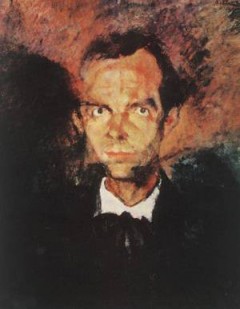 Greetings from New Haven, CT! We’ve temporarily relocated to New England for the year: I’ll be teaching composition and electronic music in the music department at Yale University.
Greetings from New Haven, CT! We’ve temporarily relocated to New England for the year: I’ll be teaching composition and electronic music in the music department at Yale University.
Coming to New Haven meant moving…which of course also meant packing up an apartment that my wife and I lived in for several years. Anyone who has moved as an adult has surely had the archeological experience of unearthing several incarnations of their life when packing. While still embracing my packrat tendencies and filling many boxes with stuff (and parting with 0 musical instruments), I am proud to report that many things were purged (ok, some of the broken Casio keyboards). And then there’s the consideration of mental baggage that one accumulates from living in various places: to compound this, I’m coming back to a school where I did my masters ca. 10 years ago.
All of this brings me to the piece that I gave most of my attention to over the summer: what I decided to keep, composed for David Searle and the Catholic University Orchestra. They’ll be premiering the piece at Carnegie Hall on 11/7. The piece is actually scored for something more like a chamber orchestra: smaller sections of violins and cellos, along with 2 double basses, are augmented with single winds and brass, and a piano. Within the strings, I wanted to have a thicker section sound, but also the ability to treat each player like a soloist (I also wanted to exclude the violas. Insert your favorite viola joke here).
As a composer with one foot in academia, I work at a far less frantic pace during the summer: with my teaching obligations in mothballs until September, I’ve got so much more time to consider compositional issues that I just don’t have the mental space to hang out with for the other 9 months. In addition to considering my output while a resident of DC for the past four years, I also found myself reflecting back on my time at Yale: specifically, the year I studied with Martin Bresnick. At the time, I had one of my most formidable cases of writers block. I had such little music to show in my lessons, that Martin and I may have in fact spent more time talking about other people’s music. Remembering those lessons, I came back to one composer and piece in particular: Béla Bartók’s 5th string quartet. what i decided to keep owes a great debt to this piece, in its linear succesion of events, and use of certain musical materials.
 Truth be told, very little is a direct quote from ol’ Béla, but I’d like to think he and I share a similar affinity for musics not typically heard in a concert hall (in my case, funk and prog rock). The piece itself is dedicated with admiration and affection to Martin, who was consistently patient with my compositional hesitance that year. As I reflect back on my four years so far at Catholic University, I can also see that many of the ways I try to create a positive environment for my own students owes much to Martin’s example.
Truth be told, very little is a direct quote from ol’ Béla, but I’d like to think he and I share a similar affinity for musics not typically heard in a concert hall (in my case, funk and prog rock). The piece itself is dedicated with admiration and affection to Martin, who was consistently patient with my compositional hesitance that year. As I reflect back on my four years so far at Catholic University, I can also see that many of the ways I try to create a positive environment for my own students owes much to Martin’s example.


